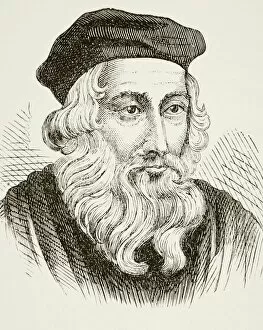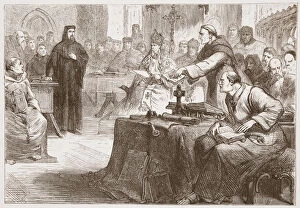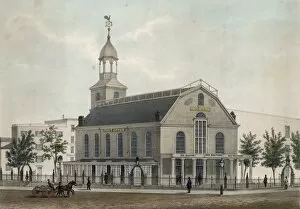Wickliffe Collection
Wickliffe: A Trailblazer in Theology and Reform John Wycliffe, an eminent English theologian, reformist, and translator, left an indelible mark on the history of England
All Professionally Made to Order for Quick Shipping
Wickliffe: A Trailblazer in Theology and Reform John Wycliffe, an eminent English theologian, reformist, and translator, left an indelible mark on the history of England. Born around 1325, his ideas challenged the religious establishment of his time and paved the way for significant changes. Intriguing illustrations from historical accounts shed light on pivotal moments in Wickliffe's life. One such depiction shows him standing before the Convocation at Oxford, fearlessly presenting his revolutionary thoughts. Another scene portrays a tense encounter between Wickliffe and monks in a bed-chamber, highlighting the resistance he faced from those who opposed his ideas. The Reformation itself owes much to Wickliffe's influence. Engravings capture him passionately explaining his beliefs before the Archbishop while another depicts him confronting bishops who sought to suppress his teachings. However, not all embraced Wickliffe's ideologies. An illustration showcases the destruction of his works at Prague – a stark reminder of how powerful institutions sought to silence dissenting voices. Yet despite opposition, popular support for Wickliffe was evident through demonstrations held at Lambeth Palace in his favor. These displays revealed that many recognized the significance of his contributions to religious thought and reform. Wickliffe's journey was not without peril; he faced trials that tested both his resolve and faith. An illustration depicting one such trial captures its intensity as it unfolds within pages of "The History of Protestantism. " Interestingly enough, amidst these historical depictions emerges an unexpected connection – John C. Wickliffe: an American vigilante leader in New Orleans during 1891. Though unrelated to John Wycliffe himself or theology altogether, this line drawing serves as a reminder that names can transcend time and geography. Sadly, even after death, controversy surrounded John Wycliffe's legacy. Wood engravings reveal how authorities exhumed and burned Wycliffe's bones, casting his ashes into the river.












